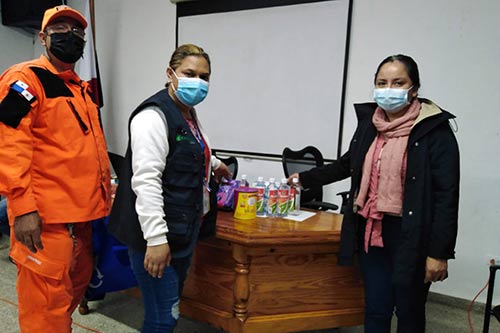News
COVID-19 heightened menstruation challenges in Latin America and the Caribbean; action and investment needed
- 28 May 2021
News
UNITED NATIONS, Panama City – The COVID-19 pandemic has upended life for people around the globe, including the way people experience and perceive menstruation. Latin America and the Caribbean region has been no exception. Movement restrictions coupled with the closure of health centres have affected access to sexual and reproductive health services, including care for menstruation-related disorders, such as endometriosis or migraines. The economic fallout of the pandemic has also limited access to menstrual supplies for many.
"Women have to choose between buying a pound of rice or a pack of feminine sanitary pads," said Claudia Vidal, founder of the wordspoderosxs collective in Panama.
This deprivation – the lack of access to water, soap and products such as sanitary napkins, tampons or menstrual cups – is commonly called period poverty or menstrual poverty, and experts fear the situation has worsened.
Stock losses and supply chain disruptions have also limited access to sanitary napkins, tampons and other menstruation-related materials. Humanitarian emergencies, too, are affecting the availability of these essential supplies. Decision makers must ensure that these essential items remain available.
"In the plans that are developed for when there are national emergencies, disasters or any other type of crisis, women and their needs must be taken into account. Having access to menstrual hygiene is a right and should not be overlooked in the planning of emergency responses," commented Yuri Pitti, of the UNFPA partner Not One Less Chiriquí.
During the COVID-19 pandemic, UNFPA has been providing training on reproductive health to adolescents, youth and teachers throughout the region, highlighting that menstruation is a natural and healthy process.

“We learn that we must take great care of our hygiene and even more so when we have a period,” said 12-year-old Jeannie Cruz, a student at the Grand Duchy of Luxembourg College in Puerto Cabezas, Nicaragua.
For her part, Lesbia Mena, a teacher at the Ignika Raya School in the José Centeno neighborhood in Nicaragua, says she was glad to share this activity with her students. “They brought a nice talk about hygiene, how to take care of yourself at the time of menstruation and learning how to use sanitary napkins. They had this need… Now the girls will be able to use the information in the best way and take hygiene measures into account.”
As part of its COVID-19 response, UNFPA delivered more than 150,000 emergency kits throughout in Latin American and Caribbean in 2020. These kits contained personal hygiene supplies, including disposable and reusable sanitary napkins, underwear, soap and related items. These were disseminated in communities where needs were greatest, as well as in humanitarian crises and quarantine centres.
“We need to stay clean, take care of our hygiene. Especially in our towns where there are many vulnerable women,” said Emilie Echare from Guanarito in Venezuela.
UNFPA also supports national health systems, which can promote menstrual health and offer treatment to girls and women suffering from menstrual disorders, and helps collect data and evidence on menstrual health and its connection to global development – a long-ignored research topic.
Menstruation should never lead to fear, shame or exclusion, nor should it leave people more vulnerable, experts say. Living with dignity, even while menstruating, is a human right.